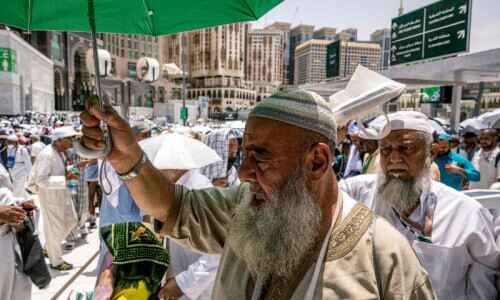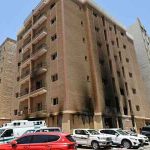Under the shadow of the Gaza conflict, hundreds of thousands of Muslims have gone to the Saudi holy city of Makkah for this year’s Haj.
Friday marks the official start of one of the biggest yearly religious gatherings in the world, and Saudi officials are attempting to maintain the focus on prayers. Tawfiq al-Rabiah, the minister of the Gulf state in charge of religious pilgrimages, issued a warning last week, saying that “no political activity” will be allowed.
One of the five pillars of Islam, the Haj, requires all Muslims with the means to conduct it at least once. As of Wednesday, some 1.2 million pilgrims from outside have already arrived in Saudi Arabia to participate.
More than 1.8 million individuals completed the multi-day Haj rituals last year. Official data indicate that approximately 90% of the population was foreign-born, primarily from Asia and other Arab countries.
According to Umer Karim, a University of Birmingham expert on Saudi politics, Israel’s waning military actions in Gaza have “created a lot of anger in (the) broader Muslim world,” making this year’s Haj a “test” for Saudi officials.
“Saudis recognize this is a slippery slope, and protest or performance by individuals or groups of pilgrims is bound to happen,” the man stated. “Therefore, the Haj is both a test of the Saudi rulers’ governance and a matter of prestige.”
Politics of pilgrimages
An AFP count based on Israeli official numbers shows that 1,194 people, largely civilians, were killed in Hamas’s October 7 strike, sparking the worst battle in Gaza’s history.
Following that, the Israeli army started a deadly operation on the Gaza Strip that, according to data from the Gaza government’s health ministry, has killed at least 37,164 dead, the most of them civilians.
Although Saudi Arabia has never recognized Israel, Crown Prince Mohammed bin Salman, the country’s de facto ruler, was thinking about establishing formal diplomatic relations with Israel before to the incident on October 7.
Saudi authorities and US officials are still in negotiations on a purported “mega-deal” that would see Riyadh recognize Israel in return for closer security ties with Washington.
Saudi authorities, who have long opposed Israel, have asserted that relations with Israel cannot be established absent “irrevocable” moves toward the establishment of a Palestinian state.
According to the official Saudi Press Agency, Saudi King Salman signed an order on Monday to accommodate 1,000 pilgrims “from the families of martyrs and the wounded from the Gaza Strip,” increasing the total number of Palestinian pilgrims to be welcomed this year to 2,000.
Saudi monarchs derive their legitimacy from the Haj, and King Salman is named “Custodian of the Two Holy Mosques” at Makkah and Madina.
However, Madawi al-Rasheed, a Saudi academic and opposition figure living in London, claimed that the Saudi government also “uses the pilgrimage to control Muslims worldwide” because it may prevent dissidents from carrying out a necessary religious rite.
“The Saudis will tighten their grip on the pilgrims in an effort to thwart any organizing related to backing Gaza. It is unclear if the pilgrims will abide by Saudi directives.
Fears of heat
This year, the religious ceremonies in Makkah and its environs take place in the midst of the scorching Saudi summer, when officials predict average high temperatures of 44 degrees Celsius (111 degrees Fahrenheit).
According to Saudi authorities, almost 2,000 individuals experienced heat stress last year, which can include heatstroke, tiredness, cramps, and rashes. Due to the fact that many patients were not admitted to clinics or hospitals, the actual number was likely far higher.
The Kaaba, the massive black cubic structure in the Grand Mosque in Makkah towards which all Muslims pray, is already being circled by a large number of worshippers who have gathered in large numbers.
In the past, large gatherings during the Haj have proven dangerous; the biggest Haj disaster occurred in 2015 when up to 2,300 people were murdered in a stampede that occurred during the “stoning the devil” ritual in Mina, near Makkah.
Bernard Haykel, a Saudi scholar at Princeton University, called the gathering’s management “a logistical achievement,” noting that heavy surveillance and monitoring were in place for both security and health reasons.
Saudi Arabia benefits greatly financially from pilgrimages to Makkah, which bring in billions of dollars as the nation, which is the largest crude oil exporter in the world, works to expand its tourism industry.
Umrah, an annual pilgrimage, attracted 13.5 million worshippers in the previous year; by 2030, authorities hope to have 30 million pilgrims undertake both the Haj and the umrah.








